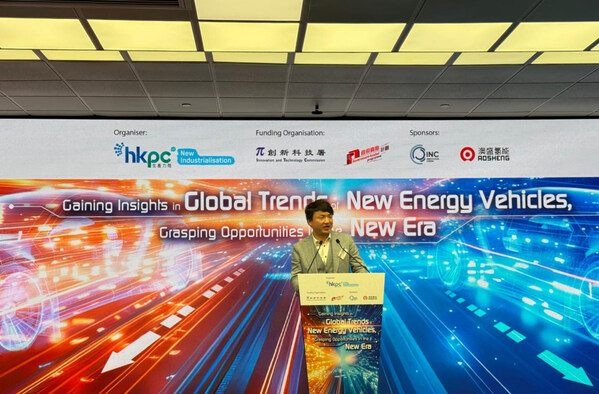HONG KONG, Aug. 8, 2025 /PRNewswire/ — On July 28, 2025 – At the international conference “Gaining Insights in Global Trends of New Energy Vehicles, Grasping Opportunities in the New Era” organized by the Hong Kong Productivity Council (HKPC), TÜV Rheinland Hong Kong emphasized the growing importance of green hydrogen certification in advancing global and regional decarbonisation objectives. Rory Meng, General Manager of Energy & Environment, Industrial Services & Cybersecurity, TÜV Rheinland Greater China, delivered a keynote address on the global development of green hydrogen strategies and the role of certification in facilitating market access and investment.

TÜV Rheinland Highlights Global Green Hydrogen Standards and Market Trends at HKPC New Energy Vehicle Forum
In his presentation, Rory outlined the urgent need for trusted certification systems to support the international trade of renewable hydrogen and its derivatives. “Trade in green hydrogen and its derivatives is no longer theoretical. It is a strategic imperative that hinges on trust — and trust begins with certification,” he stated. He highlighted the European Union’s Renewable Energy Directive (RED II and RED III) and its associated Delegated Acts, which define stringent sustainability and traceability requirements for Renewable Fuels of Non-Biological Origin (RFNBOs). These include a minimum of 70% greenhouse gas emissions savings compared to fossil benchmarks and the use of renewable electricity that is additional, time- and location-correlated with hydrogen production.
TÜV Rheinland, as one of the first certification bodies formally approved under the EU’s CertifHy RFNBO certification scheme, provides independent verification services for hydrogen and its derivatives. Rory introduced TÜV Rheinland’s comprehensive solution, which includes early-stage pre-certification, full certification audits, and re-certification based on international standards. These services support hydrogen producers in both regulated markets like the EU and unregulated or emerging markets where TÜV Rheinland’s proprietary H2.21 standard is widely used.
The presentation also examined the relevance of hydrogen certification for Hong Kong’s future energy and transportation strategy. Rory noted that while Hong Kong is not currently a hydrogen-producing economy, it holds significant potential to serve as a regional certification hub and logistics node for the import, export, and application of hydrogen-based fuels.
“To ensure that Hong Kong remains competitive in the future hydrogen economy, the city must proactively align with internationally recognized standards,” Rory stated. “This will open doors for participation in global green hydrogen trade while supporting the local adoption of hydrogen technologies in transport, logistics, and energy infrastructure.”
TÜV Rheinland has been actively supporting hydrogen projects worldwide, with reference cases across Europe, Asia, the Middle East, and South America. With a track record of technical excellence and regulatory insight, the company continues to assist industry stakeholders in navigating complex certification landscapes, reducing investment risk, and accessing international markets.


